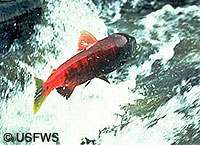
News |
- U.S. Court Protects Fish
- Auto Dealers Aim to Educate Customers
- OSB Class Action Lawsuit Reaches Manitoba
- Climate Change Legislation for Manitoba
- Manitoba Budget Supports World Heritage Site
- Agenda Set at Bangkok Climate Talks
- B.C. First Cap-and Trade in Canada
- Protect Water from Bulk Removal
- Another National Park Reserve for Canada's North
- Climate Change - A Human Rights Issue
- Gore Launches Climate Change Campaign
- Catalogues - Reducing Environmental Impact
| U.S. Court Protects Fish | 23 April 08 |
 A United States federal court ruling has stopped a controversial water plan that would endanger five species of protected salmon and steelhead trout within the California Delta. A United States federal court ruling has stopped a controversial water plan that would endanger five species of protected salmon and steelhead trout within the California Delta. Judge Oliver W. Wanger invalidated a 2004 long-term water plan to pump water out of the Sacramento-San Joaquin River Delta to farms and cities of California. The delta is the largest and most significant estuary on the West Coast. A National Marine Fisheries Service (NMSF) study indicated diverting water from the bay-delta was killing huge numbers of salmon and 66 percent of Central Valley steelhead. NMSF found that "current operations result in the loss of 42 percent of the juvenile winter-run Chinook population, and proposed project effects are expected to result in an additional 3 to 20 percent loss." "With his decision today, Judge Wanger has placed salmon survival back at the center of California's struggle to protect our natural heritage," said Earthjustice Attorney Mike Sherwood. View April 16, 2008 USA Federal Court Decision (PDF) View April 16, 2008 Indymedia article View April 16, 2008 Earthjustice press release View April 17, 2008 The Oregonian article View April 17, 2008 San Francisco Chronicle article Sources: Earth Justice, Indymedia, The Oregonian, San Francisco Chronicle |
|
 Print version Print version |
Top |
| Auto Dealers Aim to Educate Customers | 21 April 08 |
 An Internet campaign launched by the Canadian Automobile Dealers Association aims to change the industry's image yet maintains opposition to stronger emissions standards. An Internet campaign launched by the Canadian Automobile Dealers Association aims to change the industry's image yet maintains opposition to stronger emissions standards.The public education website, AutoEmissions101.ca opposes adoption of California automobile pollution standards by governments in North American. The standards would require a 30 percent reduction in emissions in new cars by 2016. The website argues new cars represent only one percent of greenhouse gas emissions in Canada and the culprits of smog and emissions are in fact older cars on the road. The site states the auto industry has signed a voluntary agreement to reduce emissions by 5.3 megatonnes by 2010, but environmental groups are not satisfied. "The federal government has said it won't do anything more than the U.S. federal government. However, Quebec, Manitoba and B.C. are pursuing California standards and this website is aimed at attacking them," said John Bennett, executive director of climateforchange.ca. "Not one air pollution, fuel economy or safety improvement has come about without regulation - and opposition from the car companies." "Fuel efficiency has lagged compared to 1970s innovations while cars which consume more and more materials are merchandized. Manitoba's new Bill 15 starts by barring old cars from entering our province. We hope our province moves to adopt tail pipe emissions standards rapidly," said Gaile Whelan Enns of Manitoba Wildlands. Visit Canadian Automobile Dealers Association - Auto Emissions 101 website View April 14, 2008 Vancouver Sun article View April 14, 2008 CanWest News article View April 14, 2008 Canadian Driver article View April 11, 2008 Climate Action Network Canada release Sources: CADA Auto Emissions 101, Canada.com, Canadian Driver, Climate Action Network |
|
 Print version Print version |
Top |
| OSB Class Action Lawsuit Reaches Manitoba | 21 April 08 |
 A class action lawsuit against nine Oriented Strand Board (OSB) manufactures has been certified. A class action lawsuit against nine Oriented Strand Board (OSB) manufactures has been certified.The lawsuit alleges certain OSB manufactures conspired in violation of US federal antitrust law to restrict the supply of OSB and raise prices. The lawsuit was filed on behalf of consumers who have indirectly purchased OSB, an engineered wood product used in construction, sold in the U.S. from June 1, 2002 to February 24, 2006. The 'Defendant Manufactures' include Louisiana-Pacific Corp, with an OSB facility located in Swan Valley, Manitoba and Tolko, with operations in The Pas, Manitoba. In addition Weyerhaeuser Co., Georgia-Pacific, Potlatch Corp., Ainsworth Lumber Co. Ltd., Norbord Industries Inc., J.M. Huber Corp. and Huber Engineered Woods are defendants. On January 29, 2008, settlement agreements were also reached with Georgia-Pacific for $1.2 million, Huber for $850,000, and Ainsworth for $1.3 million. Ainsworth has an agreement with the Manitoba Government for a $250 million OSB facility northeast of Winnipeg. Visit Oriented Strand Board - Class Action Lawsuit and Settlements website View April 8, 2008 Street Insider article Sources: OSB Class Action Lawsuit & Settlements, Street Insider |
|
 Print version Print version |
Top |
| Climate Change Legislation for Manitoba | 21 April 08 |
 On April 11, 2008, Manitoba introduced Bill 15 The Climate Change and Emissions Reductions Act. The new legislation will require the province to meet Canada's Kyoto target for 2012 and set long-term goals for 2020 and 2025. On April 11, 2008, Manitoba introduced Bill 15 The Climate Change and Emissions Reductions Act. The new legislation will require the province to meet Canada's Kyoto target for 2012 and set long-term goals for 2020 and 2025.In order to meet its Kyoto commitments, Manitoba must reduce its annual emissions to 17 megatonnes (MT). Climate Action Network (CAN-RAC) Canada congratulated Manitoba for taking a leading role in the fight against climate change in Canada. "Today is an important day for Manitobans, and the climate," said Gaile Whelan Enns, Director of Manitoba Wildlands. "Our government is acting on its commitments to reduce emissions inside Manitoba by meeting the Kyoto target. Collaboration with Manitoban communities and companies, will provide models for other provinces and states." Manitoba Wildlands is a member group of CAN-RAC Canada. The framework Bill leaves questions that will only be answered as regulations are drafted and come into force. Ms. Whelan Enns emphasized the need for an open public process for the development of regulations under The Climate Change and Emissions Reductions Act. View April 11, 2008 Manitoba Government press release View April 11, 2008 Manitoba Government Backgrounder (DOC) View Bill 15 - Climate Change and Emissions Reductions Act View April 11, 2008 Climate Action Network Canada press release View April 11, 2008 CBC article View articles from Winnipeg Sun: April 12, 2008, April 16, 2008 View April 12, 2008 Globe and Mail article Sources: Government of Manitoba, Climate Action Network Canada |
|
 Print version Print version |
Top |
| Manitoba Budget Supports World Heritage Site | 15 April 08 |
 The new 2008 - 2009 budget for Manitoba was tabled April 9 in the provincial legislature. Additional spending and other measures for water protection were included, with no content regarding protected areas commitments for the province's forest regions. The new 2008 - 2009 budget for Manitoba was tabled April 9 in the provincial legislature. Additional spending and other measures for water protection were included, with no content regarding protected areas commitments for the province's forest regions.In the midst of ongoing controversy and misinformation about location of the upcoming direct current transmission line from northern Manitoba, the government renewed its commitment to the future boreal World Heritage Site on Manitoba's east side. "Our government continues to work with First Nations communities in the bid for a UNESCO World Heritage Site designation for about 42,000 square kilometers of the boreal shield on the east side of Lake Winnipeg. Gaining international recognition for this globally significant boreal forest will maintain the ecological health of the land while providing the people who live there with opportunities for sustainable economic development." (2008 Manitoba Budget Address) View the 2008 Manitoba Budget Address View the 2008 Manitoba Budget website Source: Government of Manitoba |
|
 Print version Print version |
Top |
| Agenda Set at Bangkok Climate Talks | 15 April 08 |
 The Bangkok Climate Change Talks (March 31st to April 4th, 2008) were the first negotiations on a United Nations climate treaty since the Kyoto Protocol was negotiated 1995-97. Countries have until the end of 2009 to reach agreement on a new climate treaty to avoid a gap between end of the first phase of the Kyoto Protocol and the beginning of a new global pact. The Bangkok Climate Change Talks (March 31st to April 4th, 2008) were the first negotiations on a United Nations climate treaty since the Kyoto Protocol was negotiated 1995-97. Countries have until the end of 2009 to reach agreement on a new climate treaty to avoid a gap between end of the first phase of the Kyoto Protocol and the beginning of a new global pact.The main task in Bangkok was to agree on a work programme for the next two years. The talks ended with plans for negotiations in the next 18 months to arrive at the next treaty. Japan proposed setting sector-specific emissions reduction targets. China, India and other developing countries objected, saying it was an attempt to shift responsibility for climate change from rich to poor nations. Developing countries want rich countries to agree to set national targets first. Negotiators agreed to postpone in-depth discussion of the Japanese proposal until August 2008 meeting in Ghana. Negotiators will meet in Bonn June 2008, in Ghana August 2008 and environment ministers will meet in Poznan, Poland, December 2008. Visit UNFCCC pages for Bangkok Climate Change Talks View Reuters Fact box on 2008 Bangkok Climate Talks View April 5, 2008 Associated Press article on Google.com View April 4, 2008 Canadian Press article on Google.com Sources: UNFCCC, Reuters, Canadian Press, Associated Press |
|
 Print version Print version |
Top |
| B.C. First Cap-and Trade in Canada | 15 April 08 |
 British Columbia has announced a cap-and-trade system to reduce air pollution and greenhouse gas emissions. New legislation to cut GHGs by 33% by 2020 is part of B.C.'s plan. British Columbia has announced a cap-and-trade system to reduce air pollution and greenhouse gas emissions. New legislation to cut GHGs by 33% by 2020 is part of B.C.'s plan. Under the new Greenhouse Gas Reduction (Cap-and-trade) Act, the government will establish a cap on carbon dioxide emissions by issuing a limited number of tradable compliance units (emissions allowances) to emitters. Large emitters/polluters will participate in a government-monitored trading system that enables them to offset some emissions by trading or buying pollution credits. "It's a very important step forward in terms of building a continental carbon market," said Ian Carter, an Ottawa-based policy co-ordinator for the International Emissions Trading Association. "No one has actually done [what B.C. is doing] in North America. B.C. is definitely pioneering here." The act is expected to encourage innovative, low-cost solutions to reduce carbon pollution and will provide administrative penalties for violators. The cap-and-trade law allows B.C. to participate in the Western Climate Initiative, a partnership that involves Manitoba and seven U.S. states, including California. WCI members' population is now 63 million people with a GDP of $2.9 trillion (CAD). View April 4, 2008 CBC article View April 4, 2008 Canoe News article View April 4, 2008 Canada.com article View April 4, 2008 St. Catharine's Standard article View April 4, 2008 Globe and Mail article View April 4, 2008 National Post article View April 4, 2008 Truck News article View April 4, 2008 All Headline News article Visit Western Climate Initiative website View March 27, 2008 Pembina Institute Fact Sheet on Cap and Trade (PDF) Sources: CBC, Canoe, Canada.com, St Catharine's Standard, Globe and Mail, National Post, Truck News, All Headline News, WCI |
|
 Print version Print version |
Top |
| Protect Water from Bulk Removal | 15 April 08 |
 A recently released report by the Polaris Institute, an Ottawa-based think tank, called Turning on Canada's Tap describes how trade deals with the U.S. including the 1994 North American Free Trade Agreement (NAFTA) have loosened Canada's control over water. A recently released report by the Polaris Institute, an Ottawa-based think tank, called Turning on Canada's Tap describes how trade deals with the U.S. including the 1994 North American Free Trade Agreement (NAFTA) have loosened Canada's control over water. "We don't have legislation dealing with bulk water exports. What's required is federal legislation; a federal ban" said Tony Clarke, Polaris Institute director and author of the report. The International Boundary Waters Treaty Act bans bulk removal from Canadian boundary waters and a provincial-federal accord prohibits water sales to foreign buyers. The report identifies a five step agenda to strengthen Canadian sovereignty over our waters:
View Polaris Institute's 2008 Turning on Canada's Tap: Summary (PDF) View Polaris Institute's 2008 Turning on Canada's Tap: Full Report (PDF) View April 3, 2008 CTV article View April 3, 2008 Toronto Star article View April 5, 2008 Toronto Star article View April 3, 2008 Reuters article Sources: Polaris Institute, CTV, The Toronto Star, Reuters |
|
 Print version Print version |
Top |
| Another National Park Reserve for Canada's North | 11 April 08 |
 A new national park reserve for the Northwest Territories (N.W.T.) is being celebrated by the people of Tulita Dene, Metis and conservation organizations. Naats'ihch'oh National Park Reserve, meaning "stands like a porcupine" in Slavey - a local Dene language - and will be 1.5 times the size of Prince Edward Island. A new national park reserve for the Northwest Territories (N.W.T.) is being celebrated by the people of Tulita Dene, Metis and conservation organizations. Naats'ihch'oh National Park Reserve, meaning "stands like a porcupine" in Slavey - a local Dene language - and will be 1.5 times the size of Prince Edward Island.Canada's environment Minister John Baird announced the 1.9 million acre national park reserve has been granted interim protection. The park reserve will be adjacent to Nahanni National Park Reserve, a UNESCO World Heritage Site in the Dehcho region. "This year's conservation withdrawals in the Northwest Territories are some of the largest in North American history. These are globally significant commitments, and demonstrate that Canada's is taking action to protect the internationally important Boreal regions" said Steve Kallick of the Pew Environment Group's International Boreal Conservation Campaign. The landscape is made up of an alpine plateau along one of the country's most spectacular northern rivers. The park encompasses important habitat for the endangered mountain caribou, Dall's sheep, mountain goats, moose and grizzly bear. Canada's government has announced five major parkland expansions in the Far North. Environmental groups are applauding the government's action to preserve land with mounting pressure facing N.W.T. in coming decades from industrial development including pipelines, mines, and oil and gas wells. View April 7, 2008 Canadian Boreal Initiative press release View April 7, 2008 CBC article View April 7, 2008 Reuters article View April 8, 2008 Globe and Mail article Visit UNESCO World Heritage Site - Nahanni National Park View February 26, 2008 Government of Canada Order of Withdrawl for Disposal of Territorial Lands Sources: Canadian Boreal Initiative, CBC, Reuters, The Globe and Mail, UNESCO |
|
 Print version Print version |
Top |
| Climate Change - A Human Rights Issue | 09 April 08 |
 The Human Rights Council of the UN has officially recognized climate change as a human right issue. The Human Rights Council of the UN has officially recognized climate change as a human right issue.The Council passed the resolution put forward from the Maldives, Comoros, Tuvalu, Micronesia and other island states. The resolution identifies climate changes as a global problem - posing an immediate and far-reaching threat to people, their livelihoods and welfare. Costal areas and small island states will be affected by rising sea levels. Experts say that global warming could cause intense storms, droughts and floods - restricting access to housing, food and clean water. "The very important aspect of the human dimension is sometimes lost. Scientific and economic issues have been taken into account," said Maldives Foreign Minister Abdulla Shahid. "It is time to highlight the human face of climate change." The UN proposal called for a detailed analytical study of the relationship between climate change and human rights to be conducted by the Office of the U.N. High Commissioner for Human Rights. An independent expert will be appointed to assess countries' human rights obligations linked to safe drinking water and sanitation. Canada diplomat Sarah Geh stressed this will not create a human right to water. The Canadian Government has been strongly opposed to recognizing water as an international human right. The UN High Commission for Human Rights Louise Arbur, formerly of the Canadian Supreme Court, has resigned before her second term amid conjecture the Canadian government did not support her continuing as High Commissioner. View Human Rights Council 7th Session Resolution: Human rights and climate change (revised draft) (PDF) View March 28, 2008 Reuters article View March 28, 2008 CanWest News article View April 2, 2008 The Toronto Star article Sources: UN, Reuters, Canada.com, The Star |
|
 Print version Print version |
Top |
| Gore Launches Climate Change Campaign | 09 April 08 |
 Al Gore, former US vice president, Nobel peace laureate, and chair of the Alliance for Climate Protection has launched a three-year, $300 million campaign aimed at generating action against climate change. He has financed much of the campaign himself. Al Gore, former US vice president, Nobel peace laureate, and chair of the Alliance for Climate Protection has launched a three-year, $300 million campaign aimed at generating action against climate change. He has financed much of the campaign himself. The ambitious campaign will contain a series of videos, a Web site www.wecansolveit.org and TV advertisements during prime time. The ads highlight Americans' growing awareness of global warming and the need to translate into national policy changes. "We can solve the climate crisis, but it will require a major shift in public opinion and engagement," said Gore, "The technologies exist, but our elected leaders don't have the political will to take the bold actions required. When politicians hear the American people calling loud and clear for change, they'll listen." The Alliance plans to enlist 10 million volunteers through ads comparing the fight against climate change to the battle of Normandy during World War II or the race to send humans to the moon. Gore's campaign focuses on ensuring post 2008 US election action.  We Campaign Website - We Can Solve the Climate Crisis We Campaign Website - We Can Solve the Climate CrisisView April 6, 2008 New York Times article View April 1, 2008 PlanetArk article View March 31, 2008 Washington Post article View March 31, 2008 Seattle Times article Visit The Alliance for Climate Protection Sources: Planet Ark, Washington Post, Seattle Times, Alliance for Climate Protection, We Campaign |
|
 Print version Print version |
Top |
| Catalogues - Reducing Environmental Impact | 09 April 08 |
 ForestEthics, an environmental group, commends Canadian Tire for phasing out its paper catalogue - made from Canada's Boreal forest. ForestEthics, an environmental group, commends Canadian Tire for phasing out its paper catalogue - made from Canada's Boreal forest. Six million homes across Canada received the Canadian Tire catalogue each year. An estimated 20 billion catalogues by various companies are distributed to North Americans yearly. As part of their 'Do Not Mail' campaign, ForestEthics is urging the catalogue sector to reduce paper use, phase out endangered and boreal forest products and use post-consumer recycled paper sources, and Forest Stewardship Council (FSC) certified papers. "Catalogues have a tremendous environmental impact, from forests that are clear-cut to produce them to the energy consumed during manufacturing and delivery," said Gillian McEachern of ForestEthics. "Canadian Tire demonstrates that dramatically reducing paper use makes good business sense." Canadian Tire, along with Victoria's Secret, Williams-Sonoma, and Staples Business Depot are changing their paper products and taking leadership roles catalog initiatives. View March 27, 2008 NewsWire article View March 11, 2008 GreenBiz article View Staples - Environmental Initiatives View Staples Paper Procurement Policy (PDF) View March 11, 2008 ForestEthics campaign article View November 28, 2007 ForestEthics Catalog Industry Environmental Scorecard (PDF) Sources: News Wire, Green Biz, Staples, ForestEthics |
|
 Print version Print version |
Top |


 RSS Feeds:
RSS Feeds: